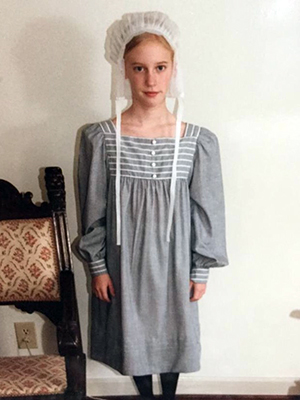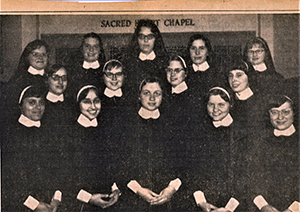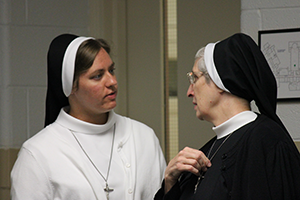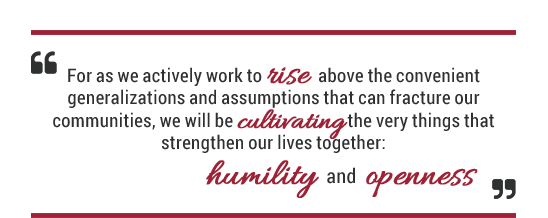Childhood Dreams Fulfilled
There is a certain mystery in the way God plants the seeds of desire in our hearts and lets them grow. Sr. Kathryn Press, ASCJ reflects on this mystery and how God has satisfied her heart’s longings in unexpected ways.

Sr. Kathryn, age 12, dons a dress fit for the prairie
When I was in Kindergarten, I wanted to be a fire fighter when I grew up. They wore cool hats and had awesome trucks. In an effort to practice the necessary skills, I sprayed water from the hose and ran around as a "siren" in an effort to alert the neighbors of any danger. In elementary school I fell in love with the Little House on the Prairie books and was convinced I'd been born at the wrong time in history. Working a farm, making cornhusk dolls, and going to school in a one-room school house sounded far better than my life at the time! Yet it was around this time, fourth grade or so, that I first told my mom I wanted to be a sister when I grew up. Given that my only exposure to religious life was from The Sound of Music, it was an interesting comment to make. I often wondered why I wanted to become a sister without ever having met a sister in person.
Yet in retrospect I hadn't met a fire fighter or a pioneer either and felt an attraction to their way of life too. I suppose this has helped me appreciate the mystery of my calling. God planted a seed in my heart that grew even though I was unaware of it. I've been a sister for eleven years now. And I see myself as spreading the fire of God's love in new hearts and new lands as part of my mission!
Read More > >
WHEN GOD STEPS IN
In our latest edition of Sisters Speak, Sr. Susan Emmerich shares the story of how God used a simple homework assignment to sweep her off her feet.
Q: How old were you when you first thought about a vocation to religious life?

Sr. Susan (top left), shortly before entering the novitiate
Sr. Susan: A more basic response for me is when I first decided religious life was definitely not for me! When I was a child, the Sisters in my home parish neither owned a car nor even drove, so when they had university classes to attend or other appointments away from home they depended on generous parishioners to provide their transportation. My mother was one of those designated drivers. I remember ringing the convent doorbell on many a Saturday to tell the Sisters that Mom had arrived to take Sister (or Sisters) wherever. Invariably the door was opened by a Sister wearing a blue checked apron who stopped her cleaning assignment only long enough to greet me and then deliver the message to the awaited passenger who usually appeared carrying a black book bag as she headed out for her classes. It didn’t take me very long to decide that Convent life was not for me since the Sisters seemed to be going to school all the time and working too hard! By age eight or nine I knew that that was not the life for me!
Fast forward to age 17 during the second semester of my senior year of high school. I thought my future was pretty well set. I had been accepted at several universities and nursing programs and looked forward to following in my mom’s footsteps as a nurse. And then God struck! One Sunday evening I was dutifully reading my English literature assignment for the next day’s class, and by the time I had finished John Donne’s Holy Sonnet 14, I knew that my plans had to change.
Batter my heart, three-personed God, for you
As yet but knock, breathe, shine, and seek to mend;
That I may rise, and stand, o'erthrow me, and bend
Your force to break, blow, burn, and make me new.
I, like an usurped town, to another due,
Labor to admit you, but Oh, to no end.
Reason, your viceroy in me, me should defend,
But is captived, and proves weak or untrue.
Yet dearly I love you, and would be loved fain,
But am betrothed unto your enemy:
Divorce me, untie or break that knot again,
Take me to you, imprison me, for I,
Except you enthrall me, never shall be free,
Nor ever chaste, except you ravish me.
Six months later I entered the Postulate, and 57 years after that I couldn’t be happier that God stepped in!
Q: What was it about the sonnet that spoke to you so strongly?
Sr. Susan: The poem reflects the poet’s own spiritual struggle, and he says that he can never be truly free unless God completely overtakes him.
Never in my wildest imaginings would I have thought I was even in a spiritual struggle of any sort, but I guess God knew that He just had to “hit me over the head” to get my attention, and this poem worked. I never doubted the message, never looked back, and definitely never regretted hearing the message. God just swept me away! Lucky me! And I’m still discovering every day how much He loves me and constantly thanking Him for loving me so well!
Read More > >
Finding Hope in Humility
After attending the National Religious Vocation Conference Convocation in 2020, Sr. Allison Masserano, ASCJ reflects on community living and what gives her hope.

“I want to be more faithful to my spiritual reading. So I just started trying to do it every day at 4:00 p.m.” This would have been a rather unremarkable statement had I heard it from one of my peers, from a sister in my formation group. We were always trying out new routines and practices and looking to each other for accountability. But, I have to admit, when a seventy-year-old sister casually mentioned this to me at the end of a brief conversation in the hallway, I was surprised. Without realizing it I had fallen into the temptation of assuming that someone a few generations older than me must be set in her ways. Jaded. Complacent. An older sister actively trying to better herself? I’m embarrassed to say, it took me by surprise.
It is easy and convenient to characterize generations with broad strokes. The young are zealous; the old are weary. And it works both ways. The old are wise and strong; the young are clueless and soft. Off-handed remarks and subconscious attitudes show that these stereotypes are present, and pervasive, in religious life. However, that interaction in the hallway, with the still-striving seventy-year-old, was not a singular exception to the rule. I can think of so many times when the oldest sister in the room was the first to volunteer for a project out of her comfort zone. I’ve had stimulating conversations about culture, technology, and current events with sisters of all ages who are open-minded, curious, and eager to learn. They are beautiful examples for me, models of such virtuous qualities as docility and enthusiasm. I have had more than enough interactions to reveal the limits of generational stereotypes. So then, why do these experiences still surprise me?

Perhaps we’ll never be able to totally eradicate stereotypes and metaphorical boxes from our day-to-day communal living. Perhaps these will always be potentially damaging temptations against which we must be on guard. This, however, does not discourage me. Instead, it gives me hope. For as we actively work to rise above the convenient generalizations and assumptions that can fracture our communities, we will be cultivating the very things that strengthen our lives together: humility and openness.
One of the overarching themes of the NRVC 2020 Convocation was the importance of storytelling. Sharing our stories helps us to feel known and listening to others’ stories increases our compassion. In community life, the more we share and learn about one another the more we’ll be able to see each other beyond generalizations, as unique individuals with burdens to carry and gifts to share. But telling our stories is not always easy. Sharing a part of ourselves is a risk, one that requires both humility and openness, and our community life is richer when we foster an environment that supports this kind of connection. One of the greatest gifts we can give to our sisters in community is the reassurance that their stories will be received with the same humility and openness with which they are shared. I witness and experience this giving and receiving all the time - in hallways and around the table, during times of shared prayer and times of recreation - and every time I am reminded of our God who favors nuances over broad strokes, particularity over generality; our God who cares to know and who loves us still. And as long as we continue to strive to love with this humble and open love, we will always have reason to hope.
Read More > >




